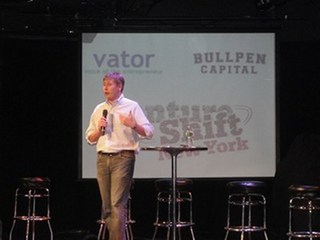Barry Silbert, CEO and founder of SecondMarket, opened up his keynote presentation at Vator and BullPen’s Venture Shift NY event with a CNBC video of commentators talking about the Flash Crash on May 6, 2010, when the Dow fell 1000 points (about 9%), and then recovered in a few minutes. Who wants their stock to deal with that kind of extreme volatility, he asked the audience.
The public market system is broken, he said.”Computers are making investment decisions based on algorithms.” Additionally, the average time a stock is held in the public markets is 2.8 months vs. five years in 1970. “Our market has become a market of traders and not investors,” he said. “The average buyer of your stock is either going to be a computer or someone who will hold onto it for one quarter’s of earnings.”
Given that it’s likely a computer will be holding a public stock, or someone holding it for just three months, second markets look a lot more appealing.
Here’s some highlights from Silbert’s excellent presentation.
– When a company misses earnings, they can see their stock crash 35%, like Netflix. Yet if you believe the way companies are supposed to be valued, no one can argue that the value into perpetuity drops that much.
– People love to say the IPO market is open. But it’s actually declining since the 1996. At that time, the average number of IPOs was around 300, 400 to 700 a year. In the ’90s, the median IPO raised around $100 million to $200 million. That’s not the case today.
– In 2002, securities regulators signed an historic $1.4 billion settlement that essentially erected a thicker, stronger and theoretically impenetrable Chinese Wall between investment banks and research analysts. The result was that research for small companies disappeared. Without research the companies became “Zombie” companies with no trading volume.
– It now takes almost 10 years to take your company public vs five years in the 90’s. What that means is that “our system is broken” because 90% of those who start companies will never see an IPO or may never get sold. There is no liquidity event for them.
– Private company trading at SecondMarket started when a former Facebook employee wanted to sell his shares. He eventually got to sell them on SecondMarket. In 2008, about $25 million in private company shares were sold. That increased to $100 million in ’09 and $400 million in 2010.
– Why go public? Raise capital. Provide liquidity for shareholders. Provide currency for acquisitions and provide branding. But have a secondary market can provide the same benefits.
– Prediction: Private markets are taking the place of small-cap IPOs.















